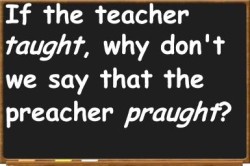 I think I have always spoken with pretty good grammar. However, I do remember when I was a little kid, I thought the past tense of bring was brang, and the present perfect tense (past participle form) was have brung. My parents, who spoke fairly well, told me that it was brought and have brought.
I think I have always spoken with pretty good grammar. However, I do remember when I was a little kid, I thought the past tense of bring was brang, and the present perfect tense (past participle form) was have brung. My parents, who spoke fairly well, told me that it was brought and have brought.
I haven’t heard too many people say brang and brung lately, but I do hear lots of mistakes in the past tense and past participle form (which is used for all the perfect tenses) of many verbs in people’s speech. The past participle form is used for present perfect (I have brought), past perfect (I had brought) and future perfect (I will have brought). Oh, by the way, broughten isn’t correct either — and I think I have heard that one.
Although there is no bring/brang/brung, there is a ring/rang/rung. Many people say have rang, but it is indeed have rung.
When I use the word swum, which I don’t very often, people look at me as if I have made up a word. Yet swum is a word. I swim, I swam, I have swum. Yup.
Oh, why can’t all the verbs just add -ed for the past tense and part participle forms like walk and talk and all the other regular verbs? That would take some fun out of the English language!
Let’s take took. Took is the past tense of take. The past participle form is have taken. It isn’t have tooken, although I have heard people say it (I know I heard some of my students say it).
Here is a very common one: I have went. Nope. It is I have gone, but I went: it is go/went/have gone.
I often get questions about hang. What is the past tense of hang? It is hung or hanged? It is both. When there is a noose involved, the past tense is hanged (and have hanged). Without a noose, it is hung (and have hung).
The correct forms of drink are drank and have drunk, not have drank. Shrink is the same. Shrink, shrank, and have shrunk.
There are some other forms that are often misspoken:
- The past tense of freeze is froze, but it is have frozen, not have froze.
- The past tense of write is wrote, but it is have written, not have wrote.
- The past tense of begin is began, but it is have begun, not have began.
- The past tense of run is ran, but it is have run, not have ran.
Thank goodness for those verbs that don’t change at all, no matter what the tense!
- Cost doesn’t change. There is no costed. It cost, it cost yesterday, and it has always cost.
- Burst doesn’t change either. There is no bursted. It burst, it burst yesterday, and it has always burst.
- Set stays set too. I set it over there, I set it there yesterday, and I have always set it in the same place.
Sit changes to sat, but stays as have sat, not have sitten!
If I lend you something, I lent it to you yesterday, and I have always lent it to you. Not lended. (or even loaned, because loan is actually to be used only as a noun.)
You wake late, but yesterday you woke late, and all week you have woken late. And then, if you are dragging, you probably dragged yourself into work. You didn’t drug yourself to work, and you have never drug yourself to work.
Oh, do I hear you begging to talk about lie and lay? Those crazy verbs!
Today I lie. Yesterday I lay. All week I have lain.
Today I lay my head down. Yesterday I laid my head down. All week I have laid my head down.
There are many, many irregular verbs in the English language. We haven’t even made a dent!
Please do take this post to all your friends . . . but do remember to bring it back . . . and remember . . .
If it ain’t broke(n), don’t fix it!



I have enjoyed reading all the comments, both regular and “tongue in cheek” varieties. I know that in speaking there are often tense versions that I use which I do not use in writing. Perhaps that hearkens to teachers who suggested the written from is to be the example of the educated person and we all wanted, or were told we wanted, to be known as educated a opposed to ignorant.
Thank you for the comment! Yes, it is true that written English is generally more formal than spoken. However, tense is generally the same for either … but we all tend to slide with speech!
I ran across this anomaly while tutoring this past weekend: the sequence for “strike” is strike-struck-struck. I had thought the past participle was “stricken” but have learned that it’s only used as an adjective in particular situations: “he was guilt-stricken” or “she was stricken with the feeling that…”
Now that I think about it, I have never heard anyone say, “John has stricken gold”….
Thanks for the great comment. Strike is an interesting verb….never thought about it. I think it is a little like shined and shone. He shined his shoes and then they shone. He has struck a deal, but he has been stricken with the flu!
I have taught irregular past tense verbs to students as young as 9 years old. I had them memorize them by groups or we called them ‘families’.. For example, one group was buy/bought, catch/caught, teach/taught, fight/ fought, think/thought etc.
We memorized them as young children would memorize math facts. We played games and laughed at how silly they were. BUT THEY KNEW them and that automaticity moved into their active language. Memorization is NOT a bad thing.
I COMPLETELY agree with you! With Common Core and technology — and short attention spans — memorization is looked down upon by many educators and administrators and the powers that be. I think memorization is important for many kinds of learning and a great skill to have. My students were so unused to memorizing, they could not memorize a list of prepositions. So they never knew what the prepositions were. I wouldn’t want to go to a surgeon who hadn’t memorized the bones!
You are definitely not the only one, but history proves you wrong, I am sorry to say…
Though its usage for ‘to lend’ is chiefly US nowadays, the origins of ‘to loan’ and ‘to lend’ coincided in Old and Middle English.
The noun ‘loan’ is from OE ‘lǽn’, from which the verb’ lǽnan’ was derived. The OE noun did not survive into ME: ‘loan’ came to us through ON ‘lána’. The verb survived in the meaning of ‘to lend’, and ‘borrowed’ a ‘d’ from the OE verb ‘lendan’ = ‘to land’.
Cognate forms of ‘lǽnan’ survived in Germanic languages like German ‘lehnen’ (‘to enfeoff’) and Dutch (my native tongue…) ‘lenen’ (Du ‘to lend’).
So there it is.
(Reply to myself…)
Since the verb forms of ‘to loan’and ‘to lend’ coincided in EarlyME, quotations are not always complete proof, but here are some that definitely prove that ‘to loan’ was used as a verb:
c 1200 Gif ðu him lanst ani þing of ðinen. (doubtful)
c 1205 Ich þe wulle lanen of mine leode-folc fif hundred schipes. (doubtful)
1542Lonyng or leying out the same for gaines in purchasing landes.
c 1640In yeares of dearth and Scarcity, [he] loaned to many of them‥wheat and other corne out of his grayneries.
………….
1740 The remainder of the said thirty thousand pounds‥shall be loaned out to particular persons.
…………..
1896 The stalls‥are barrack chairs loaned for the occasion.
I am sure it has been….ut I am also sure I have some reference book that says it is to be used as a noun. I will have to see where I found it. It was a reputable source!
Thanks for the comment! I will definitely check out that video! I love The Big Bang theory, but I don’t remember ever seeing that one!
Thank you for the refresher course to keep my English from tottering into the doldrums!
You are so very welcome!
Our noun to verb usage changes all the time. Our culture changes nouns to verbs frequently. Text is my case in point today. With the proliferation of cellular devices, we now text our replies, we texted you yesterday, and texting while driving is dangerous and illegal.
Yes – changing nouns to verbs is called nominalization.
I think Bruce was having a lend of you Arlene.
Yes. I guess now he will leave me a loan!
A most interesting lesson. Thank you.
My only disagreement is with the idea that irregularities add to the fun of using language. When I’m speaking or writing, my goal is to express an idea in a clear and–occasionally–original way. Having to stop and work out the correct form of an irregular verb interferes with the work.
Of greater consequence is the fact that failure to master standard usage sometimes is used to put down people who speak a different dialect.
H.G. Wells saw value in linguistic consistency, and tried to simplify English spelling (http://babel.hathitrust.org/cgi/pt?id=mdp.39015059378623;view=1up;seq=5). He failed miserably. Madison Avenue and mass entertainment channels have had greater success, e.g., “qwik” for “quick” nite” for “night”. Thus we learn that language can change in ways that make it more rational and user-friendly. But, it changes slowly. That’s the reality although I’d find it funner if it changes faster.
That irregularities are fun was said tongue in cheek. You must learn to appreciate my attempts at humor! Thanks for the comment!
Great examples! I have heard boughten and broughten, certainly drug and tooken. Some little kids say the last one. I heard boughten and broughten when I moved to PA and figured it was Pennsylvania Dutch! Never did hear of sitten.
I am not sure if I have heard of sitten either! or satten???
I enjoy your posts and almost always agree with you analysis.
But in today’s you indicated that “loan” is only to be used as a noun. That didn’t sound right so I looked on line. Cambridge, Oxford, Websters, and Dictionary.com all indicate that “loan” is also a verb which means to lend something.
Where did you hear that loan may only be a noun and not a verb?
Thanks for the comment. I don’t know where I heard that about loan, but I know I did! I am also obviously the only one who did!
I’ve heard that, too, about “loan,” but also can’t remember the source, so you aren’t alone with loan.